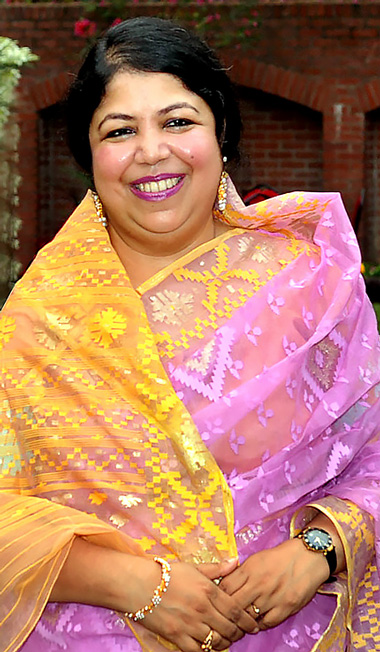Speaker for the Parliament believes women’s rights should be a trend in Bangladesh
Date:
Author: Thaiza Castilho
Dr. Shirin Sharmin Chaudhury is the first woman to be nominated as a Speaker for the Parliament in Bangladesh, one of the highest constitutional positions in the country. “It is a huge responsibility to be in this position,” she noted.

With an office of 650 square feet, she has a calm view of the Parliaments’ water surroundings and it is from there that she does her decision making, but it is also a place to meet and discuss strategies with colleagues, government officials, and development partners, and to also review legal issues.
She explains that in order to ensure the orderly flow of business in her office, she observes parliamentary rules and traditions. “It is among my duties to interpret these rules impartially, to maintain order, and to defend the rights and privileges of members, including their freedom of speech.”
Today, with the advantage of a quota for women in the national parliament (50 reserved seats and currently 20 women in general seats representing constituencies), the provision of technical guidance to women undertaking these positions is an imperative role for UN Women in promoting gender equality.
With a legal background Dr. Chaudhury has been working on constitutional and human rights but gender issues and women’s empowerment also forms a significant part of her work. For 15 years she served at the country’s Supreme Court and she has become a symbol of women rights in Bangladesh. “I dedicated my career to promoting equal rights of men and women. The country has come far in developing policies and legislation, however we know that much still needs to be done for people to put it into practice.”
Bangladesh has taken legal steps to protect the rights and wellbeing of women and children and since 1984 the country became a signatory-state of the Convention on the Elimination of All Forms of Discrimination against Women.
In 2010, Dr Chaudury was awarded Asia’s Society Humanitarian Service in recognition of her role as a leader in advocating for the elimination of violence against women and mainstreaming women’s empowerment and employment in Bangladesh.Dr. Chaudhury grew up in Dhaka and her family was always involved in politics. “Since I was a child I remember my parents’ house being full of people, most of them political leaders. She recalls her childhood being nurtured by the family’s constant encouragement of her and her sister’s education: “My parents were self-made people, they always told us to study and to make the best out of it.”
Now, she does the same with her both children. Her older daughter, Lamisa, is 21 years old and is studying economics in Boston and her youngest son, Ibtesham, who is 12 years old, is still in school.
Dr. Chaudhury believes that her title does not come in her way or affect her solidarity towards people. “Since I was a little girl my parents used to teach us to be kind to people, these values that made me want to be in a position to be able to advocate for those who can’t do it for themselves.”
UN Women has been building women’s leadership in governance institutions through strengthening women’s capacity for leadership as new members of parliament and in political parties. UN Women also encourages the development of strategies to increase women’s representation at all levels of political parties, including as candidates.
Dr. Chaudhury has been working in close collaboration with UN Women in facilitating these initiatives and participated in events to encourage women to run as candidates in the 2014 elections. The Speaker was also part of Seven, a play about women’s rights activists presented in March this year to celebrate International Women’s Day.
The Speaker recognizes the need to continue to address women’s rights. “We need to make it a trend and expand the advances to other places in the public sphere. For example, women civil servants are entitled to six months of maternity leave, the private sector also needs to follow this measure, like so many others we have in place,” she suggests.
Dr. Chaudhury lost her father when she was only in her early twenties and her mother was still very young. “We missed my father in so many ways. My mother was a career woman. I believe that this is what is important, that women are economically empowered like my mother was, because she was able to continue to work and provide for me and my sister,” she concludes.
Dr. Chaudhury’s professional and personal life is an example of why promoting women’s empowerment and leadership are essential for a society to thrive.
About UN Women:
UN Women is the UN organization dedicated to gender equality and the empowerment of women. A global champion for women and girls, UN Women was established to accelerate progress on meeting their needs worldwide. For more information about our work in Bangladesh, visit: http://asiapacific.unwomen.org/en/countries/bangladesh